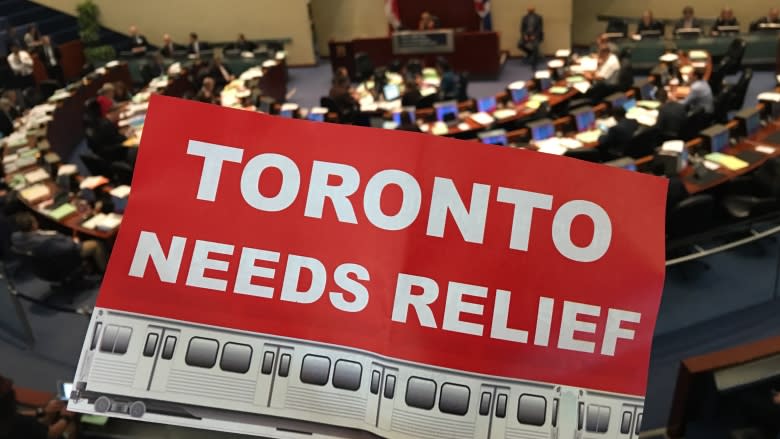Downtown relief line, Yonge subway extension studies get green light
City councillors voted to go ahead with planning work on both the downtown relief line and extending the Yonge line north to Richmond Hill on Wednesday, but not before some councillors warned Toronto is mixing up its transit priorities.
Following the 42-1 vote, city and TTC staff will begin planning the relief line, which is set to run east from the downtown core and north under Carlaw Avenue to Pape Station. Staff will also provide a business case for extending the relief line farther north to Don Mills.
"We took decades off building transit … now we have to catch up," Tory said.
TTC CEO Andy Byford said if the relief line isn't running by 2031, the transit agency won't be able to handle the number of commuters trying to move through the pinch-point at Yonge and Bloor — even with improvements like automatic train control.
Tory, speaking at Pape Station before the council meeting, said the relief line must be open before the Yonge extension, even though the latter project is further along in the planning process at this point.
"We cannot be putting more people into the subway at the top if we're not providing the relief measures along the way," he told reporters.
That's not good enough for Coun. Josh Matlow, who said the only reason the city's doing any work on the extension is to win the support of 905 leaders.
"Council and the province have placed other projects over a series of years as priorities before the relief line – that's just shameful. It's wrong; it's not responsible," he said.
Matlow confirmed with city staff that the relief line is the city's top transit priority, while in a 2013 study, the Yonge extension didn't crack the top 10 list.
Matlow's motion to reject the plans to study the Yonge extension failed 6-37.
Councillors raise concerns about Yonge extension operating costs
In total, councillors introduced eight motions to change the plans.
Coun. Janet Davis and Coun. Joe Mihevc both raised concerns about how much Toronto would be paying to run the Yonge extension.
Mihevc said while the city should be good neighbours, it shouldn't spend millions on a line that isn't a priority.
"For us, it's not a strategic decision. It's not," he said.
Davis said the city cannot afford to invite more people onto the line with no commitment to help pay for it. Tory backed Davis's motion calling for a cost-sharing agreement with York Region and/or the province, saying it would allow the city to negotiate a fair deal.
TTC Chair Josh Colle asked for the expansion of Yonge-Bloor station, which could cost $1 billion, to be deemed a priority project.
"Big ticket, but one that we've never pushed," he said, noting it could make the biggest difference for people stuck waiting for trains farther along the line.
"We have to do this work."
Colle is asking for city staff to report back on that issue. The motion passed 42-1.
What's next for the relief line? City staff will aim to have a Class 3 cost estimate and a schedule for the relief line and Yonge extension projects ready by the end of 2019.
Tory asks TTC to improve Yonge line capacity
Amid the debate, Tory's office issued a news release saying the mayor is asking the TTC to look at other short-term fixes to improve capacity on the Yonge line.
"I want to make sure we are doing everything we can now to make the ride better for riders," Tory wrote in a letter to Byford.
Tory floated one idea of starting trains further south on the line, allowing people who often miss trains to be able to get on.



